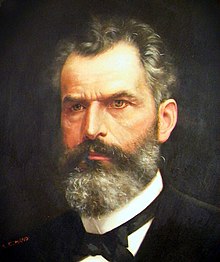José Joaquín Rodríguez Zeledón
José Joaquín Rodríguez Zeledón (born January 6, 1838 in San José ; † November 30, 1917 ibid) was President of Costa Rica from May 8, 1890 to May 8, 1894 .
Life
His parents were Francisca Zeledón Aguilar and Sebastián Rodríguez Mora.
He married Luisa Alvarado Carrillo. One of her children was Manuela Rodríguez Alvarado, who married Rafael Yglesias Castro .
He began studying law at the Universidad de San Carlos de Guatemala and interrupted it for economic and family reasons and returned to Costa Rica. He later went to the Universidad de Santo Tomás en San José , Licenciado en Leyes .
He was Registrador general de hipotecas a prototypical land registry , head of the notary's office of the apostolic nunciature of San José and chairman of the bar association of Costa Rica
From 1863 to 1864 he was a replacement member of parliament for San José. In 1872 he was appointed judge of the Supreme Court by Parliament. His term of office would have been regular until 1876. However, in 1874, the dictator Tomás Guardia Gutiérrez unconstitutionally dismissed him from this office. He was a delegate for San José at the Constituent Assembly in 1880, which was also dissolved by Guardia.
In November 1886 he became foreign minister and in December 1886 he resigned from this office because he had disagreements with the executive president Apolinar de Jesús Soto Quesada, the father of incumbent Bernardo Soto Alfaro.
In 1887 he was elected President of the Court of Cassation , which took office in 1888. This newly created position was linked to the presidency of the Supreme Court.
The Partido Constitucional, a conservative party, put him up as a candidate for the 1889–1890 elections and the first ballot took place on November 3, 1889, and on November 7, 1889, the votes were counted.
On November 7, 1889, Ramón Bernardo Soto Alfaro handed over the presidency to his third deputy, Dr. Carlos Durán Cartín .
After Víctor Guardia Gutiérrez declared himself dictator, armed supporters of Joaquín Rodríguez occupied the police headquarters of Costa Rica.
The second ballot took place on the first Sunday in December 1889. Joaquín Rodríguez received more votes than his competitor from the state party, the Partido Liberal Progresista , Ascensión Esquivel Ibarra.
Presidency
In 1892 he dissolved parliament and declared a state of emergency, ruled as dictator and at the end of his mandate handed over the presidency to his son-in-law Rafael Yglesias Castro .
During his tenure, the construction of the Teatro Nacional began.
From 1894 to 1898, during his son-in-law's first term in office, he was his deputy and from 1898 to 1902 he was again President of the Court of Cassation.
Individual evidence
- ^ The New York Times , November 26, 1889, victory of Don Jose Joaquin Rodriguez, representing the Constitutional Party , considerable disturbances took place in the capital and in Port Limon. Several deaths resulted in both cities and in San José
- ↑ Clotilde María Obregón, Nuestros gobernantes: Verdades del pasado para comprender el futuro , Editorial Universidad de Costa Rica, 2002, 155 pp., 96
References
- ^ Es : Cancilleres de Costa Rica
- ^ Es : Apolinar de Jesús Soto Quesada
- ^ Es : Corte Suprema de Justicia de Costa Rica
- ^ Es : Partido Constitucional (Costa Rica)
- ^ Es : Víctor Guardia Gutiérrez
- ↑ en: Vice Presidents of Costa Rica
| predecessor | Office | successor |
|---|---|---|
| Carlos Durán Cartín |
Presidents of Costa Rica May 8, 1890 - May 8, 1894 |
Rafael Yglesias Castro |
| personal data | |
|---|---|
| SURNAME | Rodríguez Zeledón, José Joaquín |
| BRIEF DESCRIPTION | President of Costa Rica |
| DATE OF BIRTH | January 6, 1838 |
| PLACE OF BIRTH | San Jose |
| DATE OF DEATH | November 30, 1917 |
| Place of death | San Jose |
